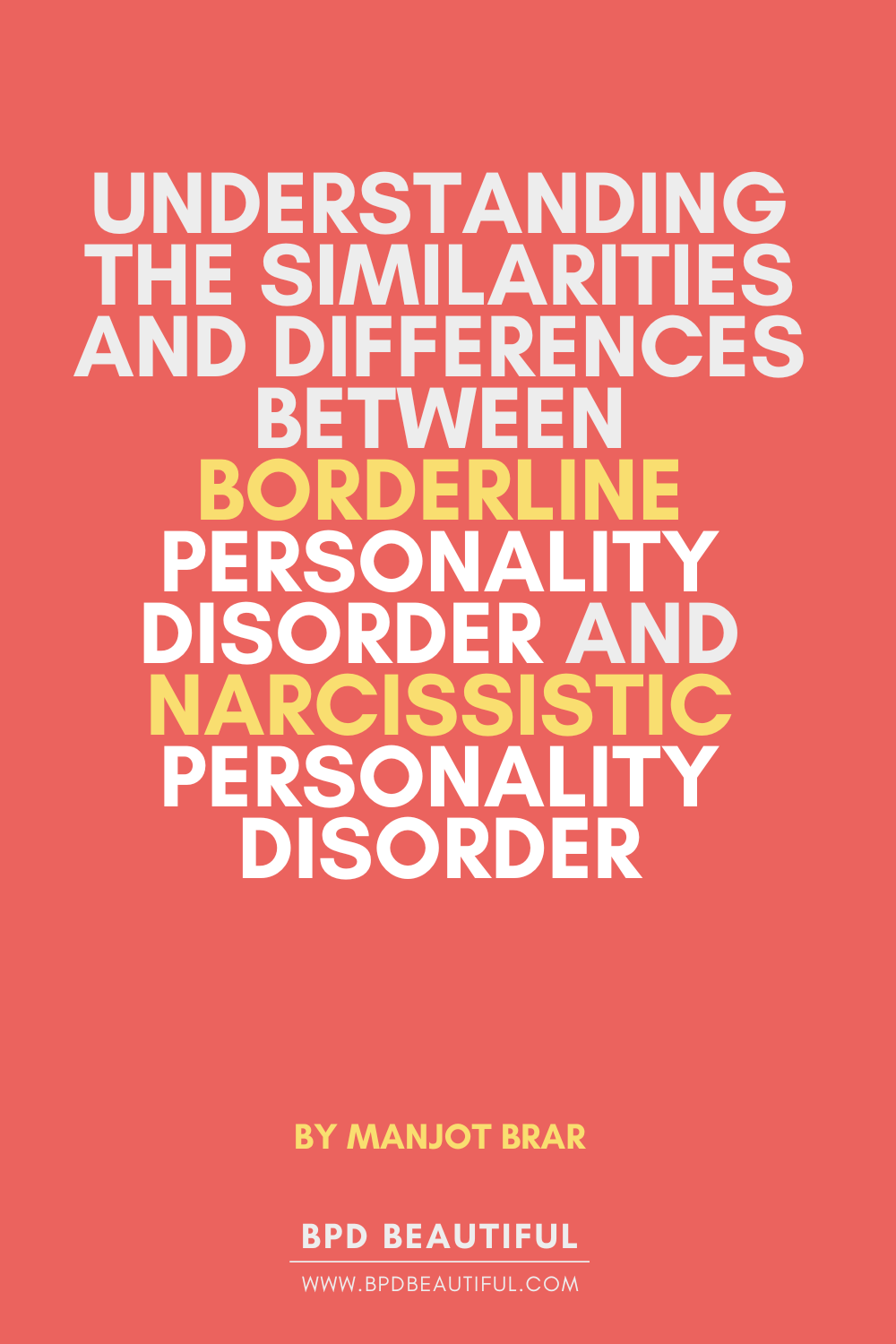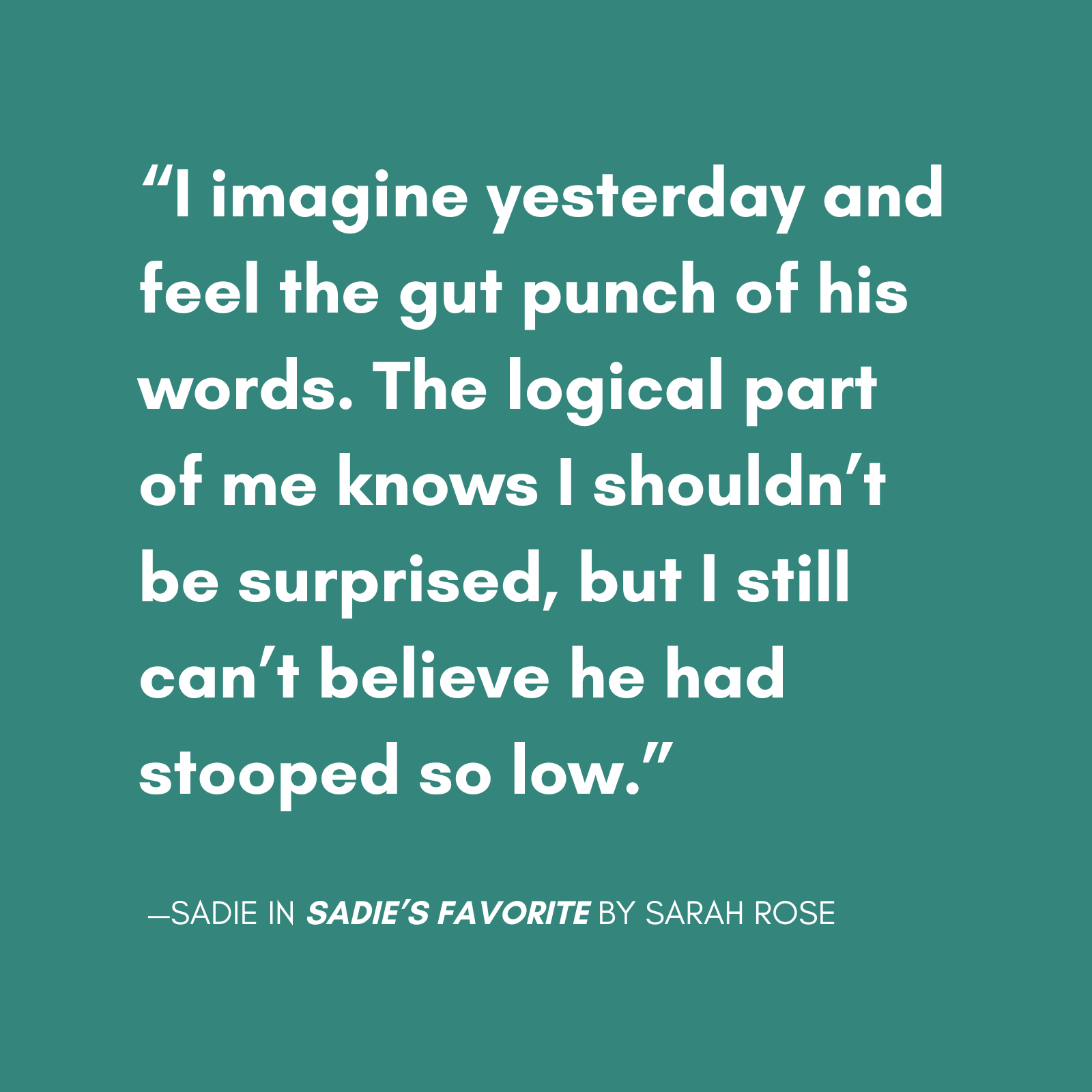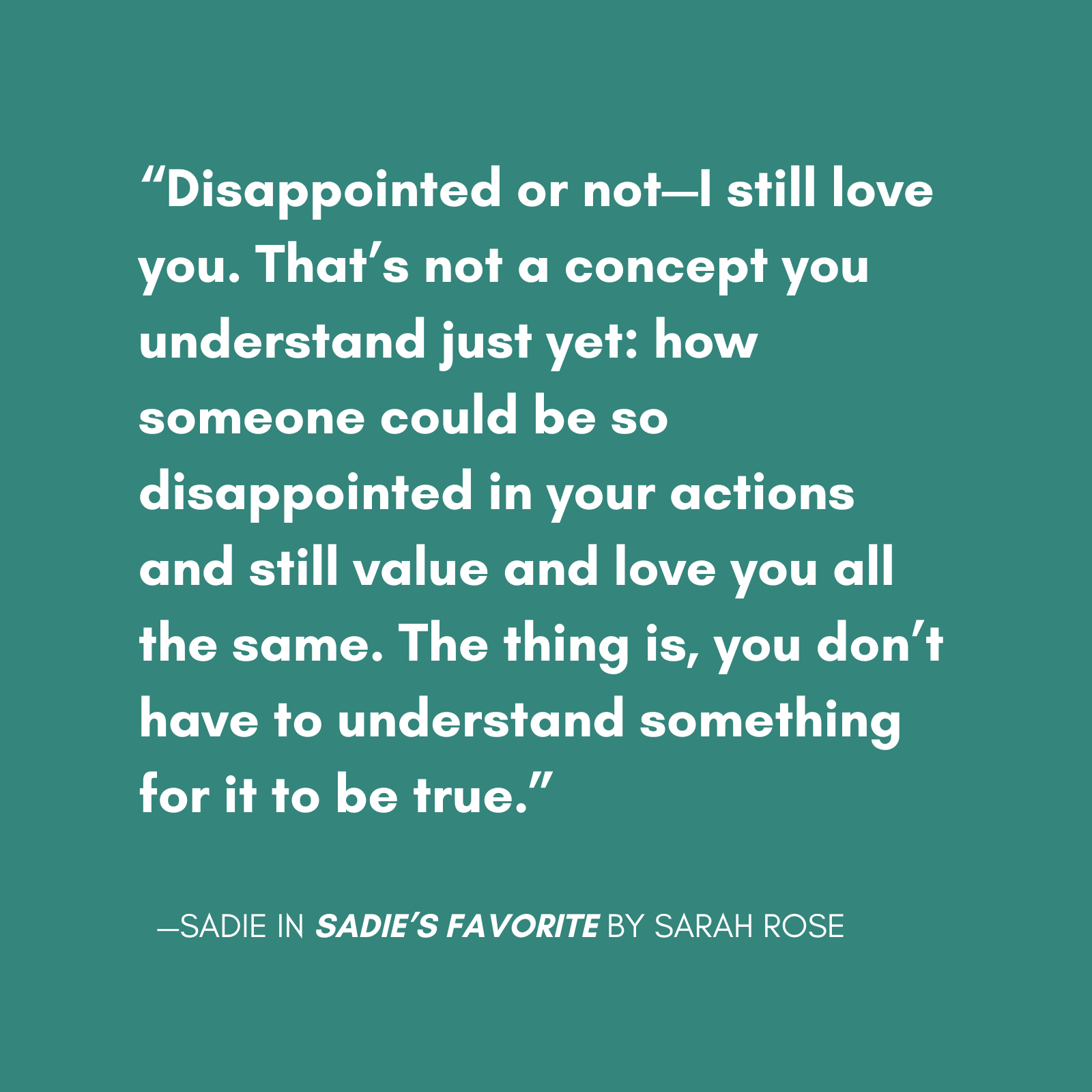Personality disorders are strongly ingrained and inflexible ways of thinking that have a negative impact on an individual´s well-being. Due to the vast array of symptoms across personality disorders, they are categorized into three distinct clusters (A, B and C) in the DSM-V. Borderline Personality Disorder (BPD) and Narcissistic Personality Disorder (NPD) are both categorized as cluster B personality disorders. As personality disorders in the same cluster may be characterized by overlapping symptoms, making one clear cut diagnosis can sometimes be difficult. However, despite similar patient presentations in some symptomatic domains, it is important to acknowledge the differences between BPD and NPD, to account for the unique underlying motivations of behavior and foster personalization of treatment
What is Borderline Personality Disorder (BPD)?
Borderline Personality Disorder (BPD), also called Emotionally Unstable Personality Disorder (EUPD) is characterized by an instability across emotions, self-image and relationships that can lead to impulsive behaviors and self-injury. BPD affects approximately 1.4% of the U.S. population, with 75% of cases being women. The causes of BPD are likely due to a mixture of genetic and environmental factors. In many cases a genetic vulnerability to BPD may not manifest unless an environmental stressor, such as childhood adversity occurs.
What is Narcissistic Personality Disoder (NPD)?
Narcissistic Personality Disorder (NPD) is characterized by a pattern of self-centered, often arrogant thinking, a diminished or entirely absent capacity to feel empathy for others and a need for constant admiration and attention. Those with NPD might have fantasies surrounding their own success and struggle to take accountability for their actions, affecting their ability to maintain healthy interpersonal relationships.
There are many types of NPD, some with varying symptom presentations and different underlying motivations. To take two examples, individuals with overt NPD tend to be extroverted and overbearing due to a genuinely high self-esteem and grandiose self-image. On the other hand, individuals living with covert NPD are more introverted and defensive as they suffer from very low self-esteems and a more unstable self-image.
Approximately 0.5% of the U.S. population has a diagnosis of NPD, with 75% of cases being men. Causes of NPD are likely to be a combination of genetics and environmental factors such as early exposure to maladaptive parenting styles.
BPD vs. NPD: Overlapping Traits and Similarities
As both BPD and NPD are categorized as cluster B personality disorders, they of course have some overlapping traits. Cluster B disorders are characterized by highly emotional, dramatic or controlling behaviors, which can be exemplified in the symptomology of both disorders:
- Exaggerated emotional reactions: individuals experiencing BPD or NPD both have a tendency to “explode” in response to minor criticisms and can allow their emotions to rule their actions due to black and white thinking (sometimes called splitting).
- Controlling others: this strategy can sometimes be implemented by both BPD and NPD individuals via possessive and jealous behavior.
- Difficulty maintaining interpersonal relationships: in both conditions these are negatively impacted as a result of personality traits that make it difficult to have healthy, reciprocal interactions.
- Fear and insecurity: at their core, both those experiencing BPD and NPD (particularly those with covert NPD) may feel worthless and have fragile egos, leading to extreme insecurities that fuel maladaptive coping strategies.
- Desire for approval: an unhealthy need for attention can sometimes arise in both conditions
- Impulsivity: People with BPD or NPD both tend to ignore the consequences of their actions, leading to dangerous and unhealthy behaviors such as gambling, excessive spending and unprotected sex.
“THIS STORY WILL HELP SO MANY PEOPLE.” -BETA READER
From the creator of BPD Beautiful, Sadie’s Favorite tells the story of a girl lost, a woman recovered and the trauma in between. Coming October 25th.
Difference Between BPD and NPD
Despite the similar presentations in symptoms that exist between BPD and NPD, it is important to note that the underlying motivations for their behavior is unique to each condition. Generally, this difference is evident through the fact that most BPD symptoms are often unhealthy coping mechanisms to deal with an extreme fear of abandonment, whereas, most NPD symptoms are defenses to prevent others from seeing their real self, sometimes a fragile ego with an underlying fear of being worthless (covert NPD), or in other cases to fuel a genuinely inflated sense of self (overt NPD).
Differences in underlying motivations for more specific overlapping traits can be seen in the table below:
| Overlapping trait | BPD underlying motivation/cause | NPD underlying motivation/cause |
| Exaggerated emotional reactions to perceived criticisms | To protect themselves from perceived rejection. People with BPD can sometimes feel extreme guilt or shame after such outbursts. | To deflect or overshadow the “threat” of revealing their true self. Due to feelings of entitlement, people with NPD often believe their reaction is justifiable |
| Controlling behavior | To protect oneself from perceived rejection or abandonment | To control others´ perception of them to maintain grandiose self-image |
| Difficulty maintaining interpersonal relationships | To reduce the chance of being rejected, those with BPD may reject others first. Alternatively, a fear of abandonment can lead to clingy and overly sensitive behavior, that others may find difficult to tolerate. | A lack of empathy and self-centeredness makes it difficult to engage in healthy, reciprocal interactions. |
| Fear and Insecurity | The fear that mainly drives their maladaptive strategies is one of being abandoned. | The fear that mainly drives their maladaptive strategies is for others to see their true self. |
| Desire for approval | To help deal with the inner loneliness and fear of abandonment. Individuals with BPD can display extreme attention seeking behaviors or cling to toxic relationships if this need is not being met. | In the case of covert NPD: To feed their low sense of self-worth so they can feel better about themselves. In the case of overt NPD: to continue to feed the inflated sense of self that they feel is genuinely deserving of constant admiration. |
| Impulsivity | An inability to regulate emotions can lead to a desire for immediate gratification. | Grandiosity can lead to a belief that they are immune to the consequences of risky behavior . |
Another key difference between the two personality disorders is one concerning self-image. Those with NPD have a much more stable self-image than those with BPD. The latter groups are often highly vulnerable individuals with “thin skin” and may have issues describing their identity to others as well as periods of dissociation (i.e. chronic feelings of emptiness). Whereas individuals with NPD can genuinely believe they are amazing, deserving individuals and so often have a stable self-image (an exception being those with covert NPD hiding their true fragile egos). This may also explain why those with BPD are much more likely to engage in self-harm behaviors and suicidal thoughts as compared to those with NPD [1]. Although, it should be noted that those with NPD are much more likely to drop out of therapy and so data is likely incomplete [2].
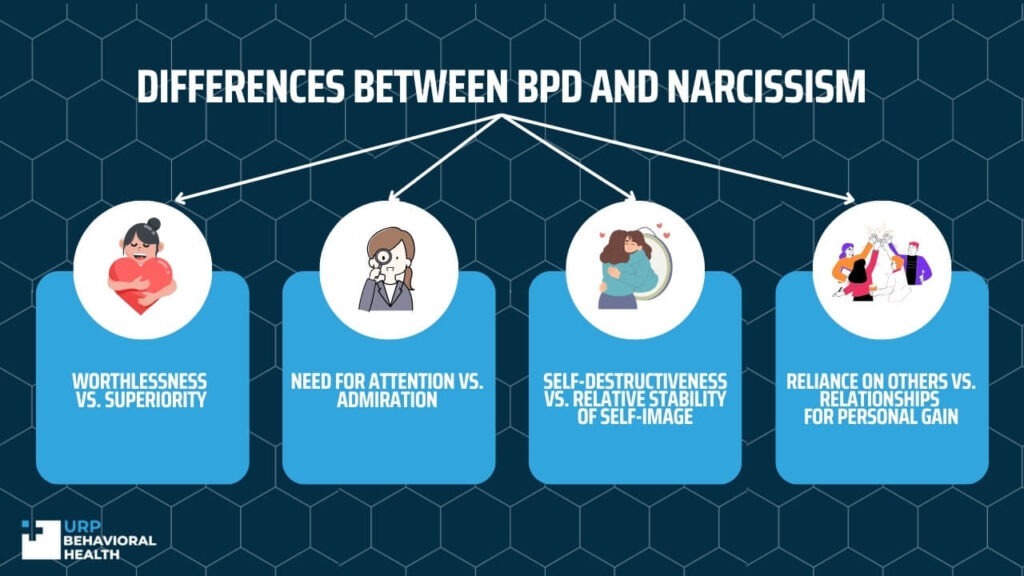
BPD and NPD: Abusive Patterns
As described previously cluster B personality disorders are characterized by emotional instability and controlling behaviors, which in some cases can lead to abusive patterns.
For example, sometimes those with NPD can engage in patterns of behavior that are labelled as narcissistic abuse, most commonly in romantic relationships. This can follow a particular cycle [3], where in the initial ´idealization phase´, the person with NPD may use love-bombing techniques to present their best self and gain the trust of others. This can be followed by a ´devaluation phase´, where the person with NPD may start to emotionally withdraw and use gaslighting techniques to get their own way. A ´discarding phase´ may come next, where the person with NPD suddenly terminates the relationship, leaving the other person feeling worthless. In some cases, the person with NPD may try to reignite the relationship later on, starting the cycle again.
Those living with BPD may also engage in abusive patterns. Continuing with the example of romantic relationships, the fear of being abandoned in this context may translate to being hyperfocused on signs that their partner is not content with them and perpetuate clingy behavior. This could also lead to extreme emotional reactions when any threat is perceived, that may fluctuate quickly and could cause the other person in the relationship to feel as if they are always walking on egg shells.
In both cases it is important to remember that these patterns of abuse do not occur in everyone diagnosed with the disorders. However, if you do recognize these signs from either your own or someone else´s behavior it may be useful to access more information and support here for NPD and here for BPD.
Borderline Narcissism: When BPD and NPD co-occur
Despite there being key differences in the underlying motivations of BPD and NPD, individuals can be diagnosed with both conditions. A randomized control trial with 188 BPD patients, found that 13% met the diagnostic criteria for NPD [4]. Research also suggests that when these conditions co-occur, the NPD diagnosis is usually the subtype of covert NPD [5]. As discussed, this form of NPD is characterized by a more fragile ego and underlying feelings of worthlessness, despite the outward presentation of someone who is self-assured, also correlating with the low self-image that pertains in BPD. Please note that many people with BPD or NPD can exhibit traits of the other without reaching the threshold for a co-morbid diagnosis.
BPD vs. NPD: Treatment Options and Recovery Rates
The first line of treatment for both conditions is usually psychotherapy, such as dialectical behavioral therapy (DBT) and cognitive behavioral therapy (CBT).
Despite the perception of people living with NPD as arrogant or selfish, the reality often is that they struggle with failure and rejection to such an extent, that they put their own health at risk. These individuals need professional support and research suggests that gradual improvements can be made in NPD symptoms when engaging with psychotherapy [6, 7]. Although, recovery rates for NPD are difficult to ascertain as between 63-64% of individuals with NPD drop out of psychotherapy [6] and many may be less likely to seek help due to societal stigma, one study conducted in 2014 involving 40 NPD patients, suggests a moderate remission rate of 52.5% after two years of psychotherapy [8]. Moderating factors for recovery include age, with one ten year study showing greater improvement in younge cohorts [9].
Other studies that have demonstrated clinically significant outcomes have listed the following therapeutic principles as facilitating patient improvement [6]:
- Setting realistic goals
- Attending to a treatment frame
- Attending to relationships and self-esteem
- Building alliance
- Monitoring countertransference
However, there are a lack of empirically developed and validated treatments for NPD [6], with therapy modalities often adapted from BPD therapeutic interventions. Despite some suggestions that this may be due to the righteousness and self-centredness of those with NPD, the large numbers of people with NPD on reddit trying to better themselves, working on their relationships and supporting others in the community experiencing similar things (a popular example being “the Nameless Narcissist“), suggests otherwise. This clearly indicates that more research needs to be carried out to investigate the optimal modality of therapy for those experiencing NPD, as well as the factors facilitating therapy adherence and recovery, perhaps via the use of randomized control trials. Please also note, there is currently no FDA approved medication for the treatment of NPD, and medication is only ever prescribed to individuals to address any co-morbid conditions.
In the case of BPD, psychotherapy, particularly DBT, has been widely demonstrated by research to improve symptoms [8]. To learn more about the different types of therapies available for BPD and the symptoms they address, as well as the role of medication, please see here. Recovery rates, refer to the alleviation of symptoms as well as consistent psychosocial functioning over time (e.g. remaining in employment). Recovery from BPD has been demonstrated in both older and newer studies to be possible, but not as likely as remission. One study in 2020 involving 58 patients, found that 81% were in symptomatic remission, and around 44% of patients were fully recovered, 12-18 years after treatment [10]. Facilitating factors for recovery include engagement with education or a vocation, suggesting a focus on these is needed alongside traditional treatment methods [10]. For more detailed information on BPD recovery rates please see here.

As a BetterHelp affiliate, we receive compensation from BetterHelp if you purchase products or services through the links provided.
BPD vs. NPD: How those diagnosed describe what it’s like
It is important to acknowledge the lived experiences of people living with BPD and NPD, as often sweeping generalizations can be made about those experiencing personality disorders due to societal stigma and media portrayals. On a similar note the following accounts are one person´s reality, rather than being representative of a whole groups.
Below is an account from someone living with BPD explaining their experience of the condition:
“Living with borderline personality disorder is like being blindfolded on a roller[P1] -coaster, not knowing whether you are going to go up or down. Unpredictable mood swings, so I never know how I’ll feel from each moment to the next. There’s so much stigma attached to BPD and other mental health problems, but BPD doesn’t seem to have as much awareness as depression or bipolar etc and this needs to change so people out there living with this won’t be afraid to speak out.
I always felt different from a young age, like I didn’t belong in this world and as much as I tried to fit in, I never felt like I did. I was diagnosed with depression at 18, and I just thought it was that, but I was a little confused as I had signs of depression but I could go from okay one minute to being a mess and suicidal the next. I honestly thought I was going mad so I didn’t tell anyone about it in fear they wouldn’t believe that my moods could swing in unpredictable ways so quickly. I was depressed most of the time, yes, but when reading about depression I knew I didn’t quite fit the diagnosis. Then at 19, I ended up in a mental health inpatient unit where I was diagnosed with BPD. Everything finally made sense, I was in and out of mental health units at first, then when I got to learn about bpd and understand myself better, things started to improve. …I also started dialectical behaviour therapy (DBT) in September, which I’m still currently doing- I strongly recommend for others.
….Fear of abandonment/rejection plays a big part in my life, In the past when studying I received help from a student advisor, for the first time in my life I felt like someone understood me so I opened up to her. But I constantly was in fear of her giving up on me, it didn’t matter how many times she tried to reassure me. I was like a ticking time bomb waiting to explode. But when I did hit rock bottom I realised how much I was relying on others to ‘save me’ when really I was the only one that could really change my life. Now looking back I realise just how unwell I was and I was incredibly lucky to have her help alongside my old therapist.
I hope that writing this I can bring a little more awareness and help others like me to know they’re not alone and know that overtime, with the right help and support you can get better! I’m living proof. I’m not recovered no but I’m on the right path and so much better at handling my emotions and for once in my life I believe in myself and actually look forward to the future.”
Below is an account from someone living with NPD giving an insight into what it is like to be diagnosed with NPD and how they manage the condition:
“ The word ‘narcissist’ gets thrown around far too often…It has diluted all meaning and trivialised the personal struggles that those with narcissistic personality disorder suffer through… when you search the term, the only articles available talk about how ‘dangerous’ we are as a people, how we’re a problem to society, and will devastate our family members, friends and romantic partners in our wake. This stigma disincentivises those with the disorder to seek out help, or even acknowledge the label – who wants to be dehumanised and seen only as a monster?
In my personal experience, NPD has caused me more distress than I would like to admit. It’s nothing like what the media depicts: an arrogant person taking pleasure in causing damage to others. It’s a significant personality disorder that I have very little control over, just as I have no control over any physical illnesses that I’ve suffered from. I have endured crippling depression and have set expectations for myself that are near impossible to reach; the disappointment when I do not meet them can crush me for days, or sometimes even weeks.
As a child, I was doted on in many ways; I was diagnosed with a blood disorder which required a lot of attention from my parents and doctors, I did child modelling and I was a high achiever academically – I became used to this interest and developed unrealistic beliefs that carried on into my adult life. I focused so much on appearance and intelligence that I lost sight of normal relationships and social conventions. I burnt myself out when I was 21, and ended up in a psychiatric facility after a suicide attempt. The depression was so overwhelming, I couldn’t see any other way out. I had no idea at this point that I had an underlying personality disorder, and when I was first told, I was apprehensive about it. I’d heard so much negative information about NPD…that there was no way in which I wanted to identify with it.
I underwent psychiatric therapy on an outpatient basis, which did help in many ways. Unfortunately, personality disorders are pervasive and cause issues in your everyday life, even if you’re in therapy or understand rationally that your thoughts are not based in reality. I still had the narcissistic lows, when supply (compliments, admiration, high marks at university) ran out, I still had the rage when things didn’t go my way and I couldn’t participate in any activity unless I was the best at it. In my mind, if I wasn’t the best, I was the worst – there was no way I could get past that and understand the shades of grey. I needed a support system, and I struggled with the idea that narcissistic people are often abusive. I am still scared about this; I analyse my behaviour with my partner and with my friends and keep myself in check to ensure I’m not hurting anybody, to become self-aware of my actions. I built a community on Youtube, dedicated to those suffering from
Cluster B personality disorders, and generally for young people suffering from mental health issues. I feel much better about expressing myself and hopefully giving some insight to those outside the community.
Narcissists can cause damage to the people around them, that is certainly true, but high functioning people with the disorder can also be wonderful additions to your life. I believe I have a lot to offer my friends and family and I try every single day to be a better person, to not give into my instincts and to find ways to express myself that don’t cause pain to others. We are not simply arrogant; we have created a false self that serves to protect our inner core – something that is often damaged or not fully developed, due to abuse in childhood or other traumas that have inherently shaped us, and we need understanding, not further stigma.
Together, I believe we can make a difference. Self-awareness is the first step towards healing and becoming a better person .”
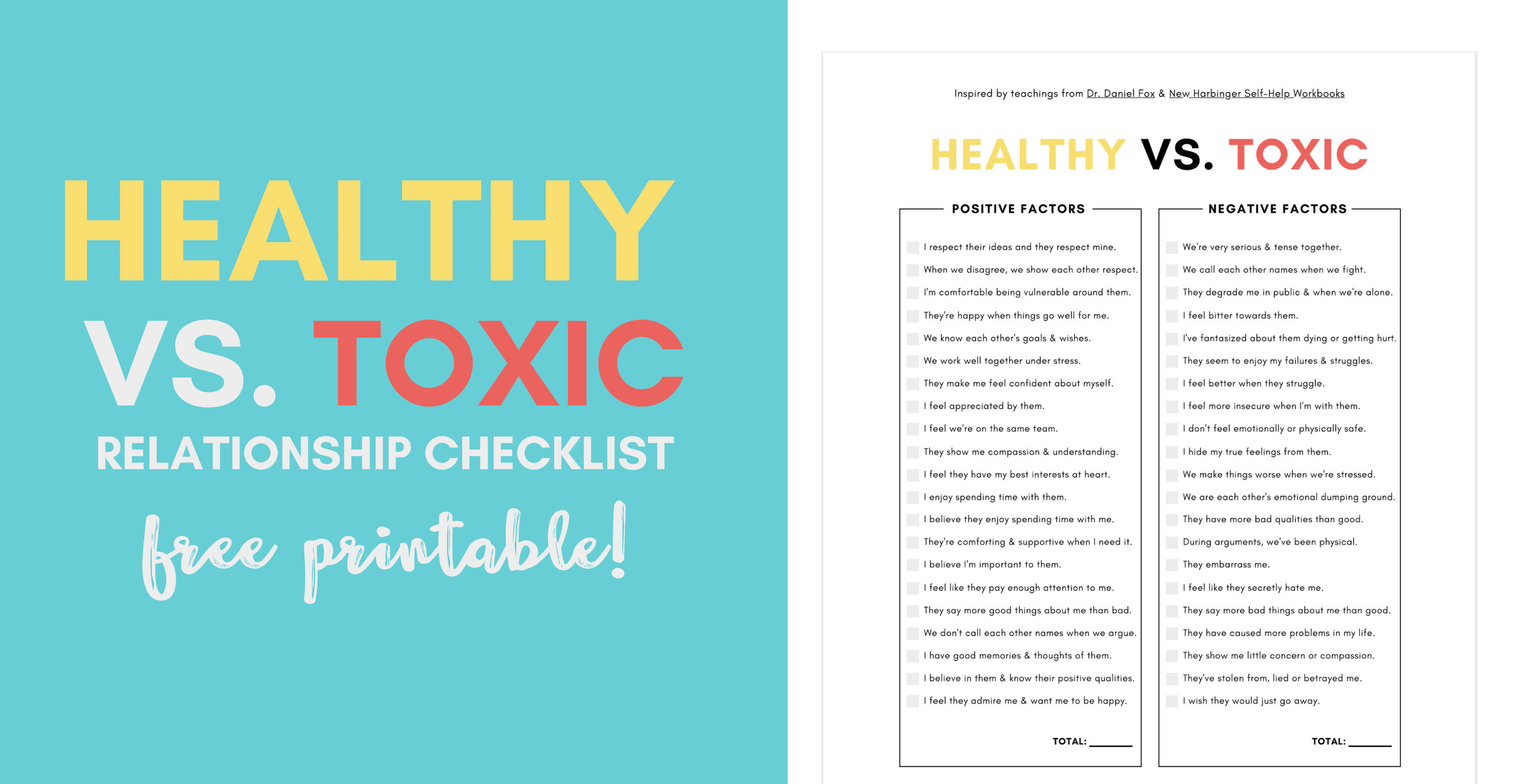
DOWNLOAD FREE PRINTABLE
Measure how healthy or unhealthy your BPD relationship is with the Healthy vs. Unhealthy Relationship Checklist.
Final Thoughts
It is important to remember that NPD and BPD are both the result of a complex interplay between genetic and environmental influence, that is beyond the diagnosed individual’s control. Every person living with BPD or NPD experiences a unique constellation of symptoms and so your individual experience of someone with BPD or NPD may not represent the condition as a whole. It is up to us as a community to challenge the stigma that is so readily attached to those with personality disorders and stand in solidarity with those who are battling both society and their own minds to better themselves.
References
- [1] https://careclinic.io/npd-vs-bpd/
- [2] https://www.ncbi.nlm.nih.gov/pmc/articles/PMC7451389/
- [3] https://www.verywellmind.com/narcissistic-abuse-cycle-stages-impact-and-coping-6363187#:~:text=The%20narcissistic%20abuse%20cycle%20refers,are%20of%20no%20further%20use.
- [4] https://guilfordjournals.com/doi/10.1521/pedi_2017_31_306
- [5] https://www.talkspace.com/mental-health/conditions/articles/borderline-personality-disorder-vs-narcissism/#:~:text=Although%20BPD%20and%20NPD%20have,the%20diagnostic%20criteria%20for%20NPD.
- [6] https://www.ncbi.nlm.nih.gov/pmc/articles/PMC10187400/#main-content
- [7] https://www.ncbi.nlm.nih.gov/pmc/articles/PMC3570677/
- [8] https://pubmed.ncbi.nlm.nih.gov/24512458/
- [9] https://www.ncbi.nlm.nih.gov/pmc/articles/PMC3593979/
- [10] https://pubmed.ncbi.nlm.nih.gov/29407567/
BPD Resources
BPD Characters: Read the first 6 chapters of Sadie’s Favorite – an upcoming novel by Sarah Rose, creator of BPD Beautiful.
Get 20% off your first month of BetterHelp. Get matched with a licensed therapist within 48 hours. Subscriptions as low as $65/week, billed every 4 weeks. Cancel anytime.
Manage your BPD symptoms with a printable workbook.
See our recommended list of books about BPD.
Start a Discussion
Have you ever engaged with any form of BPD treatment? Share your experience in the comments!
Pin This Post
Liked this post? Please help support BPD Beautiful and spread BPD awareness by pinning it on Pinterest.
